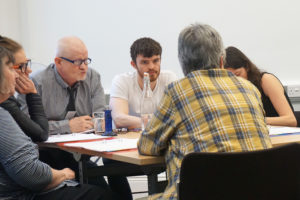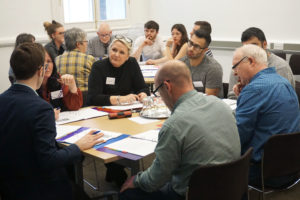Recent citizens’ juries
Citizens’ Jury on tackling anti-microbial resistance
An online citizens’ jury was held in January 2022 with 18 participants from across Liverpool City Region about regional plans to tackle anti-microbial resistance. The jury heard evidence on the growing problem of resistance to antibiotics and other anti-microbial medicines, and answered questions on local proposals to tackle the problem, such as research requiring access to health data.
Three citizens’ juries on patient data sharing in a pandemic
A set of three online citizens’ juries about patient data sharing in a pandemic, each 8 days long, were run between March and May 2021. Each jury met on Zoom, addressed the same set of questions, and hear evidence from the same set of expert witnesses, but the three juries of 18 adults were drawn from different populations (England, Greater Manchester and lastly Sussex). The report with the results of the juries, a video, and detailed documentation about the project are available on the website of the main commissioners of the juries (NIHR Applied Research Collaboration – Greater Manchester).
Citizens’ juries on hospital services in Gloucestershire
A citizens’ jury began on 19 January running for 8 days until 28 January 2021, 1pm to 5.30 pm each weekday. The topic for the citizens’ jury was the public consultation on proposed services changes. NHS information about the public consultation can be found here and jury materials are here. The Jurors’ Report, containing the jury recommendations and compiled and agreed with the 18 participants as part of the citizens’ jury process, is available for download here.
An earlier citizens’ jury about how specialist hospital services are provided in Gloucestershire was held at the Cheltenham Chase Hotel in Brockworth from 20 to 24 January 2020. A cross-section of 16 adults from across Gloucestershire took part. You can read more about that jury here.
Other citizens’ juries
Explainable Artificial Intelligence juries
Two five-day citizens’ juries were held in February 2019 to explore the kinds of explanations people should be entitled to when decisions are made about them by, or using, artificial intelligence. Scenarios in healthcare, criminal justice and job recruitment were explored. The first jury was in Coventry from 18 to 22 February, and then the same process was repeated with 18 different people in Manchester from 25 February to 1 March. The project was jointly commissioned by the NIHR Greater Manchester Patient Safety Translational Research Centre and the Information Commissioner’s Office. The juries directly informed the ICO’s Project explAIn Interim Report. You can read more, watch the video, download the report and other outputs from the citizens’ jury project here.
To learn more about how we protected personal data on this project, read this privacy notice for the AI juries.
Forest of Dean jury
The citizens’ jury about the location of a new community hospital in the Forest of Dean ran from 1pm on 30 July to 5pm on 3 August 2018. The citizens’ jury recommended Cinderford, and the two local health Boards backed that recommendation. For more information, including the Jurors’ Report, click here
Jury on use of free-text health data
This citizens’ jury was held in Brighton and was a collaboration with the University of Brighton. It explored whether or not we should be more cautious about sharing free-text information in health records than structured data (like date of birth, GP code etc.). More information is available on the Healtex website – the sponsors of the jury.
Jury for the NHS National Data Guardian
In January 2018, Citizens Juries c.i.c. designed and ran a three-day citizens’ jury in partnership with the Center for New Democratic Processes (formerly Jefferson Center) about when it is reasonable to share health records.
Two juries were run in January 2016. Two further juries were commissioned by Connected Health Cities, and designed and run by Citizens Juries c.i.c. and the Center for New Democratic Processes in November 2016.
Citizens’ Juries c.i.c.

Citizens’ Juries c.i.c. is a social enterprise dedicated to designing and running citizens’ juries in partnership with the Center for New Democratic Processes (formerly Jefferson Center), the US- based charity which developed the citizens’ jury method. The Director is Dr Malcolm Oswald, an Honorary Research Fellow in Law at the University of Manchester. Citizens’ Juries c.i.c. is supported by the University of Manchester, and is a member of the Democracy R&D Network, a network of organisations around the world developing, practising and prompting ways to improve democracy.
Citizens Juries c.i.c. asks jury applicants to provide personal data about themselves so that we can select a mix of citizens that broadly reflects the local population. Unless explicitly agreed with individuals in advance, we use this data solely for the purpose of recruiting, and running, citizens’ juries and do not share the personal data collected with other organisations, or use it for advertising. We protect it as required by law. For more details, see our privacy notice.
What are citizens’ juries?
In a citizens’ jury, a cross-section of citizens (e.g. in terms of age, gender, ethnicity, education) are recruited and paid to tackle a public policy question like “should we have a sugar tax?”. You can read how we select members of a jury here.
The jury meets for several days and is provided with reliable, impartial information from expert witnesses. The jury members ask questions of the experts, and work together to reach group conclusions. Participants often complete questionnaires at the start and end of the jury to show how their minds change as they better understand the problem they have been set.
The results are published, and can be fed back to public policymakers.
Why citizens’ juries?

Public authorities have many difficult decisions to make like: “how should we decide what drugs the NHS should pay for?” and “how should we reduce carbon emissions”
Opinion polls are important. They tell us what citizens think. But most policy questions are complex. Citizens’ juries give participants reliable information and time to explore difficult questions. They can tell us something that opinion polls and focus groups don’t tell us: what citizens think once they better understand a policy question. That can help, and give legitimacy to, public authorities making decisions that affect the public. Citizens’ juries put the public into public policymaking.
Interested in commissioning a citizens’ jury?
5 reasons to choose Citizens Juries’ c.i.c to design and run your citizens’ jury:
- The only organisation in the UK specialising in designing and running citizens’ juries
- Delivered in partnership with the Center for New Democratic Processes (formerly Jefferson Center) – the founders of citizens’ juries
- Rigorous methodology
- Focused on minimising bias – a significant critique of citizens’ juries
- Access to appropriate academic and non-academic expert witnesses.

Contact Citizens’ Juries c.i.c.
If you are interested in finding out more or in commissionning a citizens’ jury, please email Malcolm Oswald at info@citizensjuries.org